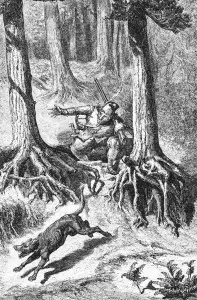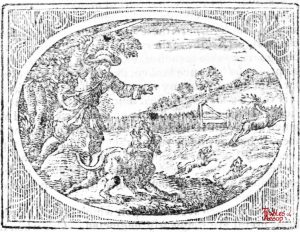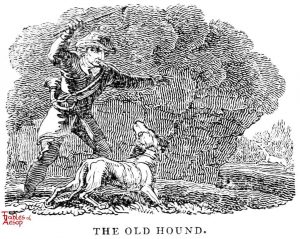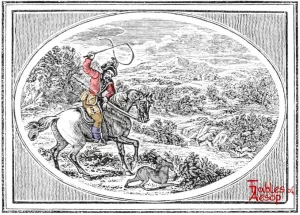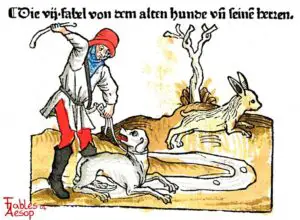An Old Hound caught but could not hold a Boar (Stag). His Master berated him ignoring the fact that he was old and unable to hunt any longer.
The spirit is willing but the flesh weak.

JBR Collection
An Old Hound, who had hunted well in his time, once seized a Stag , but from feebleness and the loss of his teeth was forced to let him go. The master coming up began to beat the Old Dog cruelly, but left off when the poor animal addressed him as follows: “Hold, dear master! You know well that neither my courage nor my will was at fault, but only my strength and my teeth, and these I have lost in
your service.”

Townsend version
A hound, who in the days of his youth and strength had never yielded to any beast of the forest, encountered in his old age a boar in the chase. He seized him boldly by the ear, but could not retain his hold because of the decay of his teeth, so that the boar escaped. His master, quickly coming up, was very much disappointed, and fiercely abused the dog. The Hound looked up and said, “It was not my fault. master: my spirit was as good as ever, but I could not help my infirmities. I rather deserve to be praised for what I have been, than to be blamed for what I am.”

Samuel Croxall
AN old Hound, who had been an excellent good one in his time, and given his master great sport and satisfaction in many a chase, at last, by the effect of years, became feeble and unserviceable. However, being in the field one day, when the Stag was almost run down, he happened to be the first that came in with him, and seized him by one of his haunches; but; his decayed and broken teeth not being able to keep their hold, the Deer escaped, and threw him quite out. Upon which, his master, being in a great passion, and going to strike him, the honest old creature is said to have barked out this apology: Ah! do not strike your poor old servant; it is not my heart and inclination, but my strength and speed that fail me. If what I now am displeases, pray don’t forget what I have been.
THE APPLICATION
This fable may serve to give to us a general view of the ingratitude of the greatest part of mankind. Notwithstanding all the civility and complaisance that is used among people, where there is a common intercourse of business, yet, let the main spring, the probability of their being serviceable to each other, either in point of pleasure or profit, be but once broken, and farewell courtesy: so far from continuing any regard in behalf of past favours, it is very well if they forbear doing any thing that is injurious. If the master had only ceased to caress and make much of the old Hound when he was past doing any service, it had not been very strange; but to treat a poor creature ill, not for a failure of inclination, but merely a defect of nature, must, notwithstanding the crowd of examples there are to countenance it, be pronounced inhuman and unreasonable.
There are two accounts upon which people that have been useful are frequently neglected. One when they are so decayed, either through age or some accident,that they are no longer able to do the services they have formerly done; the other, when the occasion or emergency, which required such talents, no longer exists. Phaedrus, who more than once complains of the bad consequences of age, makes no other application to this fable, than by telling his friend Philetus, with some regret, that he wrote it with a view; having, it seems, been repaid with neglect, or worse usage, for services done in his youth, to those who were then able to afford him a better recompence.

Thomas Bewick (The Old Hound)
An Old Hound, who had excelled in his time, and given his Master great satisfaction in many a chace, at last, through age, became feeble and unserviceable. However, being in the field one day, when the Stag was almost run down, he happened to be the first that came in with him, and seized him by the haunch; but his decayed and broken teeth not being able to keep their hold, the Deer escaped; upon which, his Master fell into a great passion, and began to whip him severely. The honest old creature is said to have barked out this apology: Ah! do not thus strike your poor old servant: it is not my heart and inclination, but my strength and speed, that fail me. If what I now am displease you, pray do not forget what I have been!
APPLICATION.
O let not those, whom honest servants bless, With cruel hands their age infirm oppress; Forget their service past, their former truth, And all the cares and labours of their youth.
This Fable is intended to reprove the ingratitude too common among mankind, which leaves the faithful servant to want and wretchedness, alter he has spent the prime of his life in our service for a bare subsistence. Where slavery is allowed, the laws compel the master to provide for the worn-out slave; and where there is no law to enforce the debt of gratitude, none but those who are insensible to all the finer feelings of humanity will neglect it. Those who forget past services, and treat their faithful servants or friends unkindly or injuriously, when they are no longer of use to them, however high their pride, are unworthy of the name of gentleman. They are, indeed, commonly of an upstart breed, with whom the failure of human nature itself is imputed as a crime; and servants and dependents, instead of being considered their fellow-men, are treated like brutes for not being more than men. The imprudence of this conduct is equal to its wickedness, inasmuch as it directly tends to extinguish the honest desire to please and to act faithfully, in the younger servants, when they see that worn-out merit thus goes unrewarded. Humanity and gratitude are the greatest ornaments of the human mind, and when they are extinguished, every generous and noble sentiment perishes along with them.

Heinrich Steinhöwel (Of the Old Dog and His Master)

Canis Vetulus et Magister
Canis venaticus, qui quondam velocitate ceteris praecelluit et magno erat olim usui et emolumento hero, iam longaevus et imbellis, fortuito cervum persequebatur et apprehensum, dentibus privatus, mox demisit. Quem iratus herus verbis et verberibus increpabat. Cui canis, “O dure et severe mihi magister, qui multifaria mea merita tam male pensitaveris!”
[Note: Also see the similar fables An Old dog and His Master and An Ass and An Ungrateful Master.]
Perry #532
